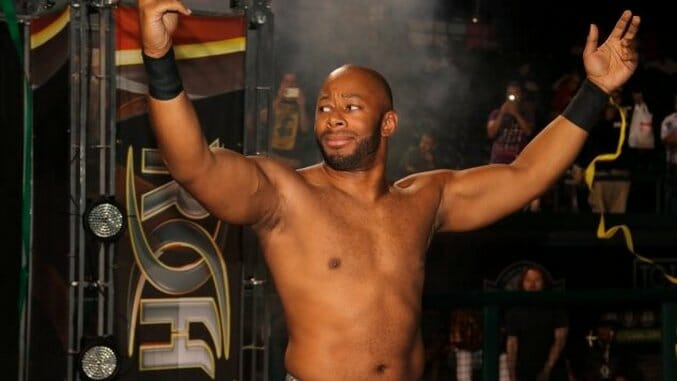Jay Lethal Talks About Being a Teenage Pro Wrestler
Photo by Scott Finkelstein / courtesy of Ring of Honor
In the 15 year history of Ring of Honor, perhaps no wrestler has accomplished as much as Jay Lethal. Touting himself as the “Greatest First Generation Wrestler,” he has the distinction of being a two time ROH Television champion, as well as the longest reigning TV champion, with his second reign clocking in at 567 days. While he was enjoying the record-setting run, he captured the ROH World title as well, asserting himself as a dominant force, capable of carrying the company to new heights.
Despite not currently able to call himself the ROH World champion, Lethal is in the mix of those vying for the title as one of ROH’s top tier talents. He has recently resigned with the company, committing himself to be the franchise of a company that churns out wrestling talent that is coveted by the industry mega power WWE.
In spite of his success, Lethal is humble about his accomplishments and acknowledges the good fortune that has befallen him on his journey to fulfill his childhood dream, one that he began to pursue at the tender age of 15.
Paste chatted with Lethal about his career and his future in Ring of Honor. This Friday night, June 23, Lethal will be facing off against Silas Young at ROH’s latest pay per view, Best in the World.
Paste: What made you get into professional wrestling?
Jay Lethal: There is a question I haven’t been asked in a long time actually. You know, a lot of these interviews asked the same questions, but I haven’t been asked that question in a long time. I got into wrestling when MTV Tough Enough was big. No I didn’t go to Tough Enough.
Paste: I was going to ask you that very question next.
Lethal: No I didn’t go to Tough Enough. I was too afraid to. I went to a local indie show called Jersey All Pro Wrestling and at intermission they said “We love this show Tough Enough, so we are going to have a contest just like it.” Of course, they did not have the money they did, so no one was going to be living in this extravagant house. This wasn’t going to be a thing that went on for days. One day you would come in for four hours, they would show you how to do three things and whoever does it best, they’re gonna pick three winners to train for free. My dad took off of work, I remember, not a whole day, a half day to get me there on time. He sat in the back as they took 30 to 35 people trying out for this contest. They got you in the ring and they made you take a bump where you fall on the ground. They made you hit the ropes, run the ropes. They made you do two other things. I can’t really remember what they are. But he sat in the back and watched the whole time. Of course, every time I’d do something, I’d look in the back and he’s watching, you know. So I felt extra added pressure because my Dad was sitting there and he took a half day off work. So the pressure was really on me to deliver. Now sadly, I was not one of the three winners. So on my way to the back, I was asking him “Well, they still have a school, do you think I can sign up for it?” But before I made it to him, they made another announcement, they said “We’re gonna actually pick a fourth winner. We weren’t going to pick him because he was too young (because I was 15 about to turn 16), but we are going to take a chance.” The fourth winner was me, but there was only supposed to be three winners. And I have been in the wrestling business ever since. What a lucky break. You know, I feel like my whole wrestling career has been like that—just one lucky break after another. And now we are here, you know what I mean?
Paste: So you got that opportunity really young. Did you end up working side jobs to support your wrestling habit, as some say?
Lethal: No, because I had just gotten out of middle school going into high school and I wasn’t old enough to work any good jobs anyway. I remember I had a “good” job for a week. It was the worst job in the world. My brother actually got me the job. But it was hell. It was hell. Especially since I was still in high school and my schedule made it so that when the last bell rang I had to run with two of my buddies. If I didn’t run, there was no catching the train. I had to run to catch the train into NYC, then I had to catch the Long Island Railroad all the way to the last stop, Ronkonkoma, just to make it to practice. If I missed any one of those trains, I wouldn’t be able to make it to practice. Because at that point, five months after I won that contest, Jersey All Pro Wrestling School closed down. So then I had to find another training school. Luckily, I found Mikey Whipwreck’s school. He was in Long Island.
Paste: That would be the New York Wrestling Connection, right?
-

-

-

-

-

-

-

-

-

-

-

-

-

-

-

-

-

-

-

-

-

-

-

-

-

-

-

-

-

-

-

-

-

-

-

-

-

-

-

-








































